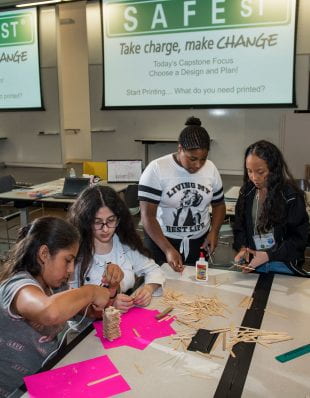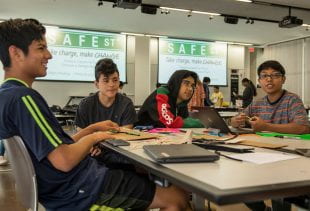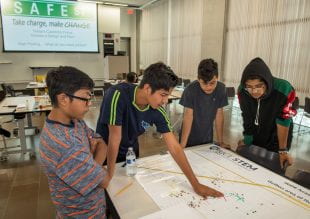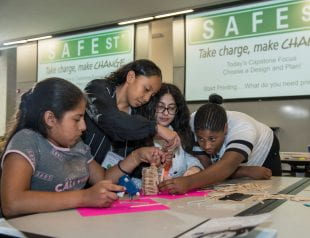New Rice K-12 program aims to improve pedestrian safety in Gulfton area
A group of middle school students from three schools in Houston’s Gulfton neighborhood got a crash course in how engineering plays a direct role in their community this summer.
The Introduction to Research and Innovative Design in Engineering Academy (iRIDE), which is the newest K-12 program under Rice’s Office of STEM Engagement (R-STEM), exposed students to career paths in engineering.
The two-week iRIDE program allowed students to directly apply what they learned during hands-on experiences in the diverse field of engineering. The pilot program included 22 students from three Gulfton-area schools: Jane Long Academy, KIPP CONNECT Houston Middle School and YES Prep Gulfton.
Gulfton was one of five communities selected for Houston Mayor Sylvester Turner’s pilot Complete Communities initiative, which aims to revitalize Houston’s underresourced communities. The program connects the City of Houston with local stakeholders and partners to enhance access to jobs, affordable homes, well-maintained parks, better streets and sidewalks, more retail stores, good schools and quality transportation options.

Students create models that represent their ideas to improve transportation safety in their area. Photo by Tommy LaVergne.
In May, Rice’s Kinder Institute for Urban Research released “Safe Streets, Safe Communities: Walking and Biking Infrastructure in Gulfton,” a report summarizing the area’s transportation challenges. According to the report, 59% of the street segments connecting Gulfton residents to public transit stops have some type of obstruction, such as broken pavement or tree and shrub overgrowth, despite having the highest public transit ridership in the city.
“Gulfton is a high-dense population area with a lot of active transportation, but Metro use is difficult, which is the opposite of what you might think,” said Roger Ramirez, assistant director for mathematics in the Rice Office of STEM Engagement and an iRIDE leader. “The area has a high rate of car accidents including pedestrian and biker collisions. Much of the area is also without sidewalks, which makes transportation difficult and unsafe.”
R-STEM partnered with Connect Communities, a nonprofit in the Gulfton area, and the National Safe Streets initiative to design a program around the Kinder Institute’s findings. iRIDE’s capstone project allowed middle school students from the Gulfton area to play the role of civil engineers by researching, planning and designing measures that would improve traffic and pedestrian safety and mobility. Kinder Institute members introduced the problem and presented their research to the students, who “took it from there,” Ramirez said.
“They were able to read the graphs and maps and understand all of the data,” Ramirez said. “They even took it one step further than their own personal experiences and considered other pedestrian perspectives, such as a person in a wheelchair or a person pushing a stroller.
“I was surprised at how engaged the students were in solving these issues,” he said. “They really took initiative and were excited about coming up with solutions and ways that they can have an impact on their neighborhood.”
On the final day of the program, six student groups presented their ideas to make the neighborhood safer for pedestrians.
“We’re working on how to better the streets and make them safer for pedestrians,” said Jesus Maldonado, a student at YES Prep Gulfton. “We think the sidewalks with damage need to be repaired, more crosswalks need to be put in, there should be a school zone put in place and the speed limit should be lowered.”

Students had access to the Kinder Institute’s report to conduct their own research. Photo by Tommy LaVergne.
“We think all three schools should get let out at the same time, too,” said Marvin Caceres Ramos, a student at YES Prep Gulfton. “A lot of kids walk to school, but it’s pretty dangerous, so we could have a school zone and maybe even a police officer to help kids cross streets and get home safely.”
“We always have to jaywalk and it’s not safe,” Maldonado said. “The crosswalks we do have only last for 10 seconds so you have to run. We think the crosswalks need to have longer lights so people with disabilities can cross too.”
To generate student interest in iRIDE, R-STEM initiated an after-school engineering club at all three schools.
“We then worked with teachers at the schools to highlight students who would be a good fit,” Ramirez said. “Any student who was committed to the engineering club is open to new ideas and loves working with their hands.”
Students had the chance to hear from professional engineers. NASA’s John Graf spoke about his work improving air filtering systems in a closed environment such as a space suit. Dena Green, an engineer with the Harris County Flood Control District, presented her work on solving Houston’s flooding issues. Frank Leon and Alex Alvarado from the Texas Department of Transportation discussed several major road projects currently underway and the years of planning it takes to complete them.
Throughout the program, iRIDE students visited several STEM landmarks on Rice’s campus, including a tour of the Bioscience Research Collaborative, where they visited the Biomaterials Lab and spoke with lab manager Tony Melchiorri, who showed students his work using 3D printers. They also visited Rice’s NEST 360° and met project manager Yvette Mirabal, who introduced the students to life-saving devices for infants in underdeveloped countries.
“The students were able to immediately relate to the iRIDE work as it directly impacts their daily routine,” Ramirez said. “I hope this created a spark in them that will continue to grow.”
R-STEM plans to continue the program next year.
“We hope to shift the after-school program more toward the teachers and schools,” Ramirez said. “We would provide the projects and some materials, and the schools would lead the program so the students would feel more comfortable working with teachers they are familiar with.”
R-STEM serves as the single point of contact for all science, technology, engineering and mathematics outreach and education efforts at Rice. In addition to K-12 teachers, R-STEM serves elementary through secondary school students, undergraduate and graduate students, and faculty and researchers.



